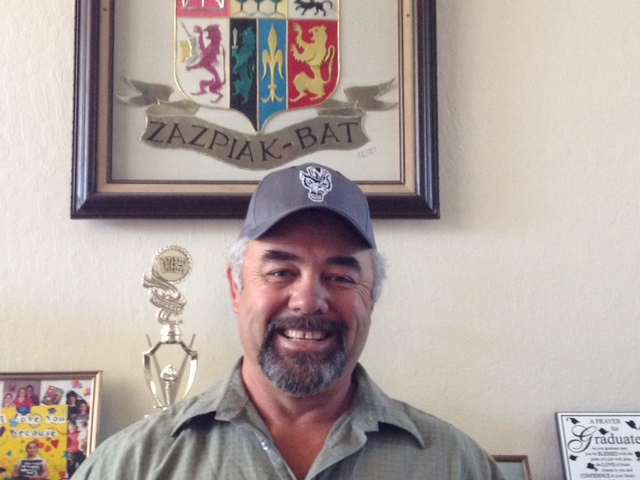basque heritage worldwide

07/03/2014

ADVERTISING
Joseba Etxarri. For many years, almost since he arrived to the US in 1979, everyone around, family and friends know him as Manny. When he arrived from Durango he didn’t have a driver’s license but got one after a couple of years here – “for only $10,” “I learned to drive on a closed circuit in an open-pit mine,” he says – until becoming the professional driver that he is today, with 35 years of highway behind him, first covering the US from one end to the other, driving his truck home, until today making five trips a day between Reno and Dayton, nearly 500 miles or 800 kilometers, starting work at three, four, or five in the morning.
- The life of a truck driver is hard…
-It’s not easy. It depends on what kind of work you do, coast to coast or geographically more limited. If you drive coast to coast it can be pretty hard, and it is better suited for younger drivers. Here the distances are huge, but you are still in the same country, although some laws and regulations vary from state to state. What we call coast to coast here, in Europe supposes changing countries, language, customs and police many times. I have done everything here, with various kinds of trucks, but now, after years, I am more settled, I drive an oversized truck and currently haul 40 tons of gravel and sand for construction and concrete plants with two axels, measuring 105 feet in all, that comes to about 30 meters, weighing 130,000 pounds, or more than 40 tons.
-You have to master the machine to dare that…
-Just like with any other job, you get used to it, but for sure it carries with it a certain responsibility and you always have to be alert. When I drove long haul, in the 80s and 90s, that kind of work was more varied and entertaining, but I had to work long hours and sleep little. Now, laws have changed and it’s more regulated. I still have to get up early, but when you reach my age, driving long haul is more difficult, that’s work for younger folks and since I remarried in 2002, I have settled in Reno to be closer to my family.
- Is the truck driver’s life in the US like what we seen in the movies?
-Yes, and no. Movies are that, movies, but even when they are caricatures, they still reflect a part of the reality. But like I said, a lot has changed in recent years.
-Is it a lot different to drive in the US and in Euskadi?
-I got my license here and when I have to drive there, I do notice the difference. The speed limits are different, here was have more plains, and in Euskadi it’s all mountains. I think that trucks have to stay at 80-90 kilometers an hour there, but here you can go 110 or 120 on the highway, and in some specific areas you can do more than 130. In Euskadi the trucks are narrower, and here the shoulders are wider. I don’t think there are trucks like I drive there with three axels and Caterpillar motors.
-The world crisis began in the US and hit Nevada hard. Were you affected?
-Without a doubt. We got through it the best we could and with time, things eventually improved. I’m lucky now, I work in construction and we’ve had some important projects, a solar energy plant, transporting concrete and material for many projects, some at the gold mines…but we did have some pretty poor years. Now we are in a period where there is more work. You have to work hard but the pay isn’t bad. But this is America: you are paid when you work, there is no holiday pay, but they do pay for our medical insurance and we get a week of paid vacation a year. That seems strange to folks there, but that’s the way it is. When you start in the company you get one week vacation after your first year, and after five with the company you get two, which increases up to four weeks a year after 15 years with the company. Otherwise you are paid between $20-$25 an hour, with overtime being paid at time and a half.
-Your life is rather normal, nothing like your younger days.
-That’s because it is nothing like crossing the country without a rest, to Canada or Montana or to live in one place and not leave a certain radius for your work, or at least the state. In my case, my family had a lot to do with it, as well as my age. I had a daughter in 2003 and there is no doubt that all this affects you, makes you settle in and gives you a better quality of life.
-In Reno, are you part of the local Basque club, the Zazpiak Bat Basque Club?
- Yes, maybe more so before than now, but I have served on the board of directors at different times. My wife is also Basque, born here, and she and my two daughters are all dantzaris – we are members. In a couple of weeks, on July 19th we will attend the local Basque Festival at Wingfield Park in Reno. Besides that, Donostia and Reno are sister cities, Basques have been part of the history and reality of this state for many generations.
ADVERTISING
ADVERTISING
ADVERTISING
ADVERTISING
ADVERTISING
© 2014 - 2019 Basque Heritage Elkartea
Bera Bera 73
20009 Donostia / San Sebastián
Tel: (+34) 943 316170
Email: info@euskalkultura.eus